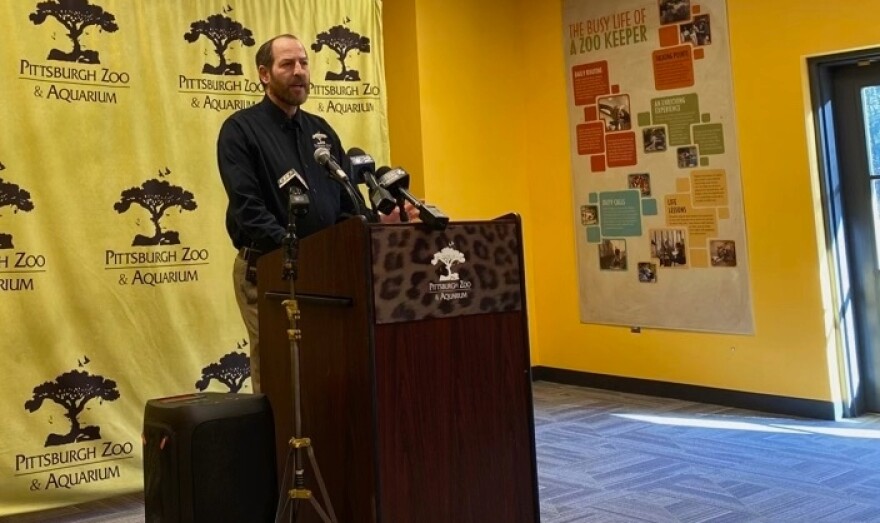Pittsburgh Zoo & Aquarium officials held a press conference Tuesday to address recent animal deaths. Five animals have died at the zoo since July 2023 — three in the past month.
Mrithi, a male silverback gorilla and the first gorilla born at the zoo, died on Feb. 1 under a routine sedation at 31-years-old. Zoo officials said Mrithi had been showing some mobility issues.
An 18-year-old sea lion named Seahawk (Hawk) died during a routine anesthetic procedure on Feb. 16 to diagnose an illness. Zoo officials said Hawk had not been eating and had an adverse reaction to the sedation.
A two-year-old elephant calf named Tsuni died from elephant endotheliotropic herpesvirus on Feb. 15. Daryl Hoffman, the zoo's vice president of living collections, said elephants from birth to age eight are at highest risk for the disease.
The zoo closed one day two weeks ago to allow staff members to grieve.
A Quality of Care
Jill Nizan, director of conservation operations for American Humane, an organization that works to ensure the safety, welfare and well-being of animals, said that the Pittsburgh Zoo’s number of deaths in the past year falls within an expected range for the facility. According to their website, the Pittsburgh Zoo & Aquarium is home to more than 8,000 animals representing over 600 species.
“The Pittsburgh Zoo & Aquarium was among the very first institutions to be awarded certification by American Humane and has continued to maintain its high standards for animal welfare for more than seven years,” Nizan said. “We remain committed to working with the zoo as more information becomes available. We commend Pittsburgh Zoo for its transparency and long-term care of the animals.”
Jeremy Goodman, CEO of the zoo since 2022, said he is committed to full transparency.

“When I arrived here almost two and a half years ago now, I made several commitments; one of those commitments was to excellence in animal welfare, and we certainly are doing that here in Pittsburgh Zoo and Aquarium,” Goodman said. “Another commitment I made was full transparency, transparency for our board, for our staff and our community.”
“Historically, here at the Pittsburgh Zoo, we've celebrated births and milestones together with everybody. But sharing out tragedies and deaths is something that's very, very new,” he added.
Hoffman said that the zoo performs about 125 to 175 anesthetic procedures per year, and that these procedures are needed for physical exams of their more dangerous wild animals.
“We do quite a number of anesthetic procedures throughout the year, and our team is excellent at it,” Hoffman said. “But, these are all different animals. And just like with people, it can be very safe. But there's always a person who has an allergic reaction to something. And unfortunately, those can be fatal.”
Zoo officials said several of the animals that died were close to life expectancy, and no human errors were made in their care.
Caretaker Care
Joe Greathouse, director of Oglebay Good Zoo in Wheeling, West Virginia, said mental health days for zoo caretakers are becoming more common.
“It's almost like losing a pet or even a family member; you've had that individual in your care sometimes … its entire life, or your team members' entire career,” Greathouse said. “You spend probably more holiday time with them than you do with your own family, so it is a big loss and is pretty crushing whenever you lose somebody that you care for at the zoo."
Greathouse said that zoo caretakers experience compassion fatigue like any other caretaker and that zoo caretakers tend to second-guess their care, especially when an animal passes away.
“If anything happens to the individuals in your care, even if they happen to get sick, happen to get hurt, which — accidents can happen, just like with us walking and tripping and falling — [zoo caretakers] take that to heart and second-guess themselves,” Greathosue said, “wondering if they had done their best to take care of the animal.”
The zoo is currently accredited through the Zoological Association of America. It voluntarily gave up accreditation with Association of Zoos and Aquariums (AZA) in 2015, reportedly over a dispute about elephant management. The zoo is working to regain that accreditation and said recent deaths have not jeopardized that process.
<i>Betül Tuncer</i> contributed to this report.





